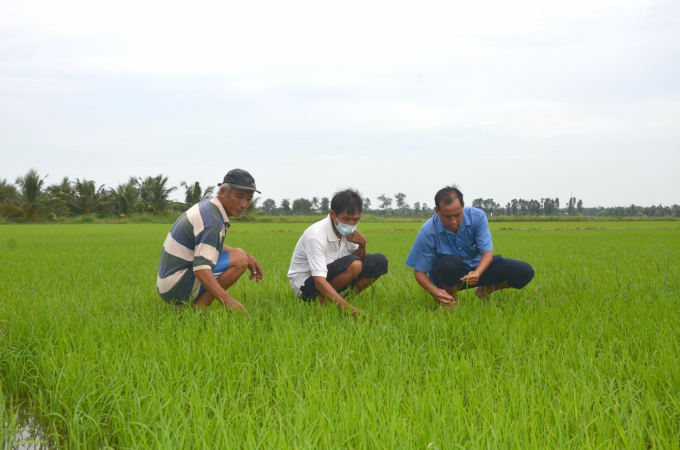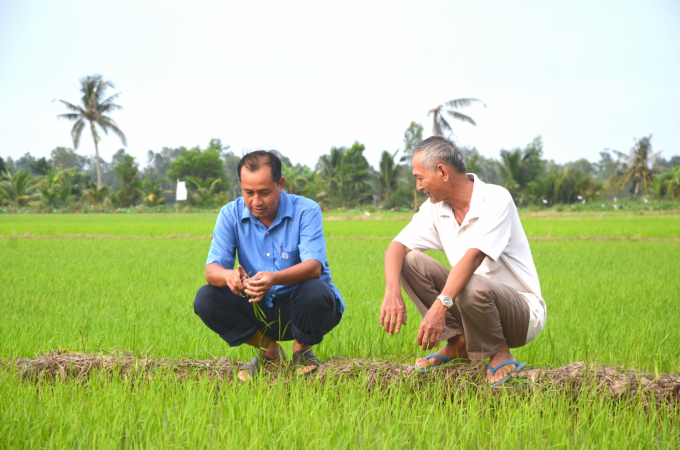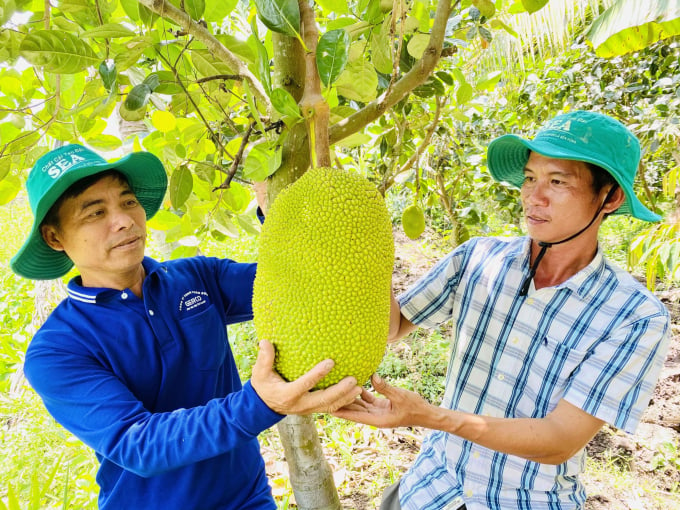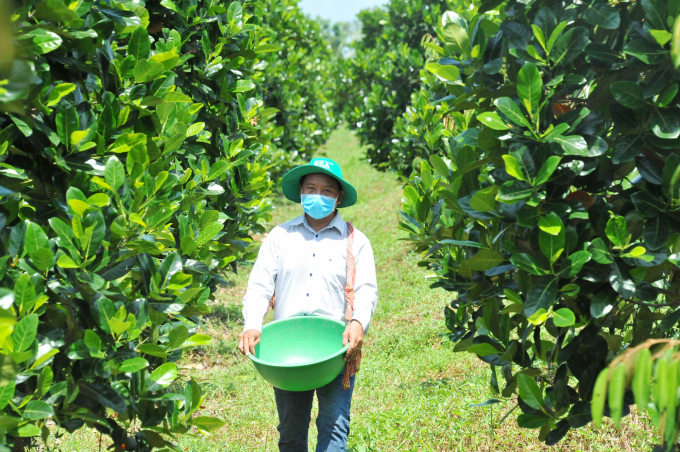May 23, 2025 | 13:31 GMT +7
May 23, 2025 | 13:31 GMT +7
Hotline: 0913.378.918
May 23, 2025 | 13:31 GMT +7
Hotline: 0913.378.918
In order to reduce the pressure of rising fertilizer costs, many farmers at present have chosen organic cultivation.
At Chau Hung Agriculture, Production and Trade Cooperative (Bai Vang hamlet, Hung My commune, Chau Thanh district, Tra Vinh), 59 households with more than 47 ha participating in the conversion to organic rice cultivation in the 2020 autumn-winter crop. The cooperative has now grown to 162 households with an organic rice production area of 130 ha in the 2021 - 2022 winter-spring crop.

Farmers in Chau Hung Agriculture, Production and Trade Cooperative (Bai Vang hamlet, Hung My commune, Chau Thanh district, Tra Vinh) have switched to organic rice cultivation in 2021 - 2022 winter-spring crop. Photo: Minh Dam.
Mr. La Quoc Yen, director of the cooperative said, “The cooperative will invest in inputs such as seeds, organic fertilizers, and pesticides. At the end of the crop, the cooperative buys rice from farmers at a price higher than the market price by VND 200/kg. It is worth noting that despite converting to bio-organic processes, the rice crop still has a stable yield.
According to Mr. Cam, the production cost for the whole crop is only VND 12 million/ha. He only used 30 kg of chicken manure and 9 kg of nitrogen fertilizer, so the fertilizer cost was only VND 3.9 million/ha, much lower than the inorganic fertilizer intensive rice production model (about VND 10 million/ha).
While many people show concerns about high fertilizer prices, Mr. Cam and the members of Chau Hung Cooperative are not too worried. The production cost of the whole crop in fact is only 50-60% compared to farming according to the procedure of using chemical fertilizers, but their productivity and profits are still guaranteed.

Converting to organic rice cultivation helps reduce the cost of rice production by 50-60%, but the yield does not fall too short compared to normal and the price is high which results in an increase in profit. Photo: Minh Dam.
Facing the current record high fertilizer price, many farmers in fruit-specialized production areas in Can Tho City have boldly switched from chemical fertilizers to bio-organic fertilizers to reduce investment costs while still maintaining the overall yield at the end of the crop.

Farmers use the production procedure of using organic fertilizers to help fruits meet the standards and sell at high prices. Photo: Le Hoang Vu.
The 7 ha of durian garden with super-early jackfruit tree (Thai jackfruit) of Mr. Dao Huy Luc in Dinh Khanh A hamlet, Dinh Mon commune, Thoi Lai district, Can Tho city, is a prime example.
Mr. Luc said that thanks to using bio-organic fertilizers, both of his jackfruit and durian orchards are less susceptible to pests and disease, the leaves and roots grow very well. The Thai jackfruit grown in Mr. Luc's garden gives particularly large fruit with an average weight of 15-20 kg/fruit, so over 85% of the fruits are classified as grade 1 and can be sold to traders at a great price.
And in Dong Thap province, several production models have begun to form, gradually switching cultivation to the organic direction. The 8,000 m2 of green-skinned pomelos organic model of Mr. Nguyen Van Muoi (also known as Mr. Ut Mot) in Tan Binh commune, Chau Thanh district, having an annual income of hundreds of millions of Vietnamese, is one of the notable cases in the area.

Facing the situation of high fertilizer prices, farmers are paying more attention to using organic fertilizers. Photo: Minh Dam.
"Actually, no matter how productive rice or fruit is, when the cost of fertilizers and materials is too high, there may be even a loss after deducting input costs. If the productivity is high but the overall plan turns out to be a loss, it's better to just have lower productivity but make a profit," said Mr. Ut Mot.
Having that mindset, Mr. Ut Mot studied hard and acquired experiences from many places. In the end he decided to come up with his own organic fertilizer formula by incubating soybean residues, pineapple peels, beer wort, bananas,… to replace chemical fertilizers. This has helped his family to reduce annual costs by 40-50% compared to the conventional method.

Farmers compost organic fertilizer for fruit production. Photo: Le Hoang Vu.
Mr. Ut Mot shares his key method:
In order to have organic fertilizer to use, he uses jars or barrels to put in soybean residues, pineapple peels, beer wort, bananas... and then incubate the decay within 1.5 - 2 months to be able to take it out and fertilize the pomelo root.
For pomelos preparing to make flowers, he mixes compost with water to spray on leaves and stems. When pomelos are in the fruiting stage (the fruit is as big as a fist), he uses self-composted organic fertilizer plus fresh milk and chicken eggs to spray on the fruits so that they can have beautiful skin, limit the attack of pests, and have their deliciousness improved.
Mr. Ut Mot took advantage of beneficial natural enemies and traps to catch insects, which is a great way to prevent pests without using pesticides. He also raised weaver ants as "bodyguards" for pomelo trees at the same time.
Weaver ants will capture and eat all kinds of worms, spiders, repel harmful winged insects, and emit a smell that scares insects away. Orchards that reared weaver ants have a reduced pest density, and the fruit is more beautiful and gleaming than those that do not raise and release weaver ants.
Translated by Samuel Pham

(VAN) The People's Committee of Tra Vinh province has approved an adjustment to the investment policy for the Green Hydrogen Plant project, increasing its area to approximately 52.76 hectares.
![Reducing emissions from rice fields: [2] Farmers’ commitment to the soil](https://t.ex-cdn.com/nongnghiepmoitruong.vn/608w/files/news/2025/05/05/dsc08881jpg-nongnghiep-140632.jpg)
(VAN) Clean rice cultivation model in Thuong Tan commune, Bac Tan Uyen district, is assisting local residents in achieving sustainable agriculture by substantially reducing costs, increasing productivity, and protecting the environment.

(VAN) At the conference to disseminate Resolution No. 68, AgriS introduced its digital agricultural ecosystem and reaffirmed its commitment to accompanying the Government in promoting private sector development and sustainable agriculture.

(VAN) 'Blue Ocean - Blue Foods' initiative is designed to restore marine ecosystems and establish sustainable livelihoods for local communities by cultivating a minimum of 1,000 hectares of cottonii seaweed in the first three years.
/2025/05/21/4642-3-112707_603.jpg)
(VAN) The V-SCOPE project has made direct contributions to three out of six pillars of the Comprehensive Strategic Partnership between Vietnam and Australia.

(VAN) Facing the threat of rabies spreading to the community, Gia Lai province urgently carries out measures to vaccinate dogs and cats on a large scale.

(VAN) Disease-free livestock farming not only protects livestock herds but also stabilizes production and livelihoods for many farmers in Tuyen Quang.